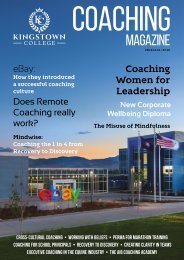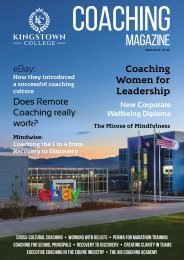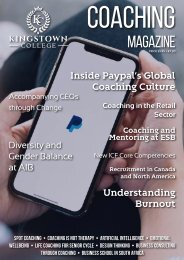Kingstown College Coaching Magazine vol.5 2019/2020
Welcome to another information filled publication of our Coaching Magazine!
Welcome to another information filled publication of our Coaching Magazine!
- No tags were found...
Create successful ePaper yourself
Turn your PDF publications into a flip-book with our unique Google optimized e-Paper software.
www.kingstowncollege.ie
69
…many studies
have described
the vulnerability
attached to
athletes during this
process and how
this vulnerability
adds to the
transitional stress.
to large companies, multinational
corporations and public-sector bodies.
Creating this unique link through the
mentoring programme enabled talented
rugby players to be partnered with
talented business people.
Prior to the announcement of the launch,
the foundations were put in place for
the programme, commencing with an
invitation to IoD members to respond
to a request to partake in this mentoring
initiative. An overwhelming response
was received from the members and,
throughout that summer, the IoD worked
in conjunction with IRUPA to develop
panels of mentors who could offer a
wide range of skills and experience
which players could access. The role of the
IoD mentors was to assist players in postplaying
career planning, the setting of nonrugby-related
goals, including educational
and personal development, and facilitate
industry-specific experience. The role of
the mentor was also seen as one of advice,
support, encouragement and networking
opportunities and introductions. For players
at these levels, the focus is always about
preparation, and this initiative was an
opportunity for them to apply the same
approach in developing their off-field
careers. Mentors and players were matched
based on a range of factors, including
common interests, educational background,
professional interests, skills and geographical
proximity, with players in each province
taking a ‘hands-on’ approach to selecting a
suitable mentor.
Nearly 100 mentors were assigned to the
initiative from the IoD, with the aspiration
that 60 players would be involved in the
programme.
Reason for embarking on the mentoring
programme
Drawing together research which has been
carried out into the transition for a top
athlete from his or her sport to a career which
will provide them with both the financial
security and a fulfilled life, many studies
have described the vulnerability attached
to athletes during this process and how this
vulnerability adds to the transitional stress.
Research recognises the dedication it takes
to achieve and maintain professionalism or
elite standards, but this may come at a cost
(Pearson and Petitpas, 1990). The narrowing
of focus may alter the developmental
perspective and inhibit certain life skills
and life experiences, which would be of
assistance in career planning and personal
planning (Blann, 1985; Pearson and Petitpas,
1990; Sowa and Gressard, 1983).
Other studies have shown that there is
a reduced level of career maturity in top
athletes. A potential explanation for this
reduced level may be found by examining
developmental theory. As individuals
reach late adolescence, they are faced
with the task of establishing their personal
identity (Chickering, 1969; Erikson, 1959).
As explained by Marcia et al. (1993),
identity development necessitates an
active exploration of possible roles and
behaviours, followed by a commitment to
the occupational and ideological options
that are most consistent with an individual’s
values, needs, interests and skills. It has
been proposed that the commitment and
exclusive dedication necessary to excel in
sport may restrict athletes’ opportunities to
engage in exploratory behaviour (Chartrand
and Lent, 1987; Pearson and Petitpas, 1990),
which is critical for subsequent personal and
career-identity development (Super, 1957).
Individuals who make commitments to roles
without engaging in exploratory behaviour
are said to be in a state of identity foreclosure
(Marcia et al., 1993).
Foreclosure may be brought on by
the demands and expectations of the
environment or may be a result of
individual choice (Danish et al., 2004).
In college undergraduates, identity
foreclosure has also been associated
with a dependent decision-making style,
in which responsibility for important
decisions (e.g. career choices) is deferred
to others (Blustein and Phillips, 1990).
Several authors have suggested that the
physical and psychological demands of
intercollegiate athletics, coupled with the
restrictiveness of the athletic system, may
isolate athletes from mainstream college
activities, restrict their opportunities
for exploratory behaviour and promote
identity foreclosure (Chartrand and
Lent, 1987; Nelson, 1983; Petitpas and
Champagne, 1988). Consistent with these
findings and the theoretical propositions
of Jordaan (1963) and Super (1957),
research has shown that many athletes
have restricted career and educational
plans (Blann, 1985; Kennedy and Dimick,
1987; Sowa and Gressard, 1983). In






